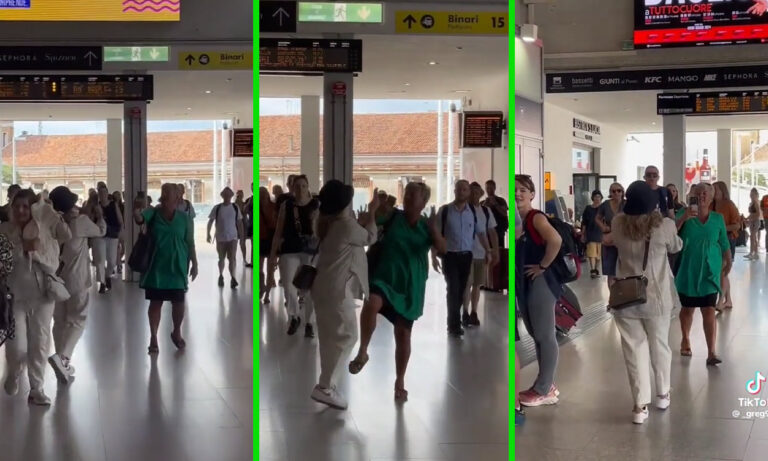Viral TikTok attenzione pickpocket lady Monica Poli’s political allegiance exposed

In the quaint streets of Venice, a seemingly ordinary encounter took an unexpected turn when a TikTok video featuring Monica Poli confronting a thief went viral. In no time, her assertive cry of “attenzione pickpocket” became an internet catchphrase, resonating with thousands and topping trending digital memes. This newfound fame turned Poli into a social media sensation, and she soon found herself at the centre of public admiration, even being compared to the fictional superhero, Batman.
As a member of the group Cittadini Non Distratti (CND), which translates to Undistracted Citizens in Italian, Poli and her vigilante companions have patrolled the streets of Venice for over three decades now, tirelessly confronting and shouting at anyone suspected of theft. According to The Economist, this group’s efforts have contributed to more than a third of pickpocketing arrests in the city. Consequently, Poli garnered praise and accolades, being hailed as a guardian angel and even earning the endearing moniker of serving “nonbinary tea.”
However, a shocking revelation has since emerged, challenging the narrative of Poli’s heroic crusade. She was “milkshake ducked,” a term coined to describe the swift downfall of internet stars whose true colours come to light after their initial surge of popularity.
Contrary to her perceived progressive stance, it was revealed that Poli is associated with Lega Nord, a conservative political party with a controversial history. Originally founded to advocate for Northern Italian separatism, the party has shifted its focus towards far-right politics, and nationalism, while drawing considerable criticism for its divisive policies and xenophobic rhetoric. Its slogan? “Italians first.”
At the forefront of Lega Nord’s leadership is Matteo Salvini, a figure notorious for his attacks on Islam, the Roma community, gay marriage, and migrants. His inflammatory remarks and hostility towards certain demographics have contributed to the rise of racism and xenophobia within Italian society, culminating in the presidential victory of far-right politician Giorgia Meloni earlier this year.
In the past year, Italy has witnessed dozens of attacks targeting Black people and Romani individuals, spread across the nation from Treviso to Gioia Tauro, including Florence and Rome. These assaults have ranged from drive-by shootings with air guns, where the attackers reportedly invoked Lega Nord’s leader Salvini, to the tragic assassination of a Malian trade unionist advocating for migrant workers’ fair pay.
Even Italian under-23 discus thrower champion Daisy Osakue, of Nigerian descent, fell victim to an egg thrown from a car, injuring her eye. While police have taken action, the government’s response has been more reserved. Despite criticism for his anti-migrant policies, Salvini remains unyielding, echoing Mussolini’s words, “many enemies, much honour,” and dismissing widespread Italian racism as a mere invention of the left.
I must admit, I was so captivated by Poli’s videos, and her catchy phrase would frequently escape my lips around the house. However, the disappointing revelation that this beloved icon is, in fact, a councillor for Lega Nord has left me disheartened. As an Italian person, who was born and raised there, we all know very well what that means.
It’s also been revealed that Poli holds an institutional role within the city of Venice. In addition to the images and posts shared on her social channels, the 57-year-old is a Councillor of the Municipality of Venice, Murano, and Burano. Elected through the Lega Nord party, she has been a member of the CND for years, which denounces the continuous acts of pickpocketing on the streets of the touristy city.
This revelation casts a shadow over Poli’s campaign against pickpockets, challenging the perception of her as a benevolent force. While she undeniably catches offenders red-handed, some commentators are now arguing that her actions amount to racist harassment against the Roma community. In essence, she is accused of targeting people based on appearances, and her occasional successes do not vindicate the underlying biases.
Poli’s own account of how she identifies pickpockets raises further questions. She told the New York Times that she possesses an innate intuition, stating: “When I see them, I know they are pickpockets. It is so strange to say… I have something inside me, and I recognise it immediately.” This abstract sixth sense gives rise to suspicions that her political affiliations might inform her judgments, making it imperative to consider the implications of her actions within the context of Lega Nord’s extremist values.
As Poli’s journey from vigilante to political figure unfolds, it serves as a stark reminder that appearances can be deceiving, and individuals who capture public adoration may carry hidden agendas that warrant a closer examination. Before idolising people solely based on their viral fame, it is crucial to understand who they truly are as individuals, delving beyond the surface to uncover the realities that lie beneath.





